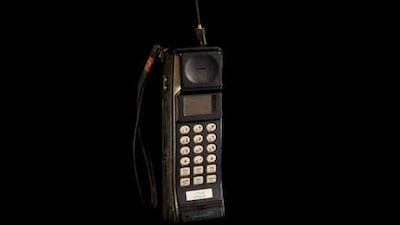The Emirates Telecommunication Corporation, better known today as Etisalat, was founded in 1976 and within a few years had become one of the first networks in the world to offer mobile phones.
Video: 8. Etisalat phone - 1987
Etisalat was founded in 1976 and within a few years had become one of the first networks in the world to offer mobile phones, like this Japanese NEC TR5E1000-9A, which was launched in the autumn of 1987.
--------------------------
This model, a Japanese NEC TR5E1000-9A, was launched in the autumn of 1987 and, despite its bulky appearance compared with today's models, represented a transition from the first "brick" mobile phones.
Costing around Dh8,500, it was something of a status symbol, helped by the release of the film Wall Street that year, in which the mobile phone represented all that was desirable and reprehensible about yuppie values.
In the UAE, the phone was marketed as the "anis", an Arabic word meaning a companion who brings happiness. It came complete with the old Etisalat logo, somewhat incongruously, the dial from an old landline phone.
This particular model was bought by Mohammed Al Fahim, who is what we would call these days an early adopter.
Today he keeps the phone in his private museum: "It's very heavy, you cannot carry it in your pocket, and talk time would be about 45 minutes. Then you would have to recharge it for about 2 hours. So you used it only when necessary."
In fact, the use of mobile phones in the country predates even Etisalat - "much earlier than anywhere else in the world," says Al Fahim.
In 1969, Sheikh Zayed, as Ruler of Abu Dhabi, needed a communication system that would allow him more easily to conduct the process of negotiating the federation that would become the UAE.
He purchased a private car phone system which was distributed to government officials, members of the court and to the other sheikhs. "My father, being one of the sheikh's followers, got a mobile phone in his car," Fahim says.
Today, mobile phones, most weighing a few grams, can browse the internet, update a social networking account and let a husband in a labour camp talk to his wife a continent away.
It is worth remembering that four decades ago, they helped to build a nation.

